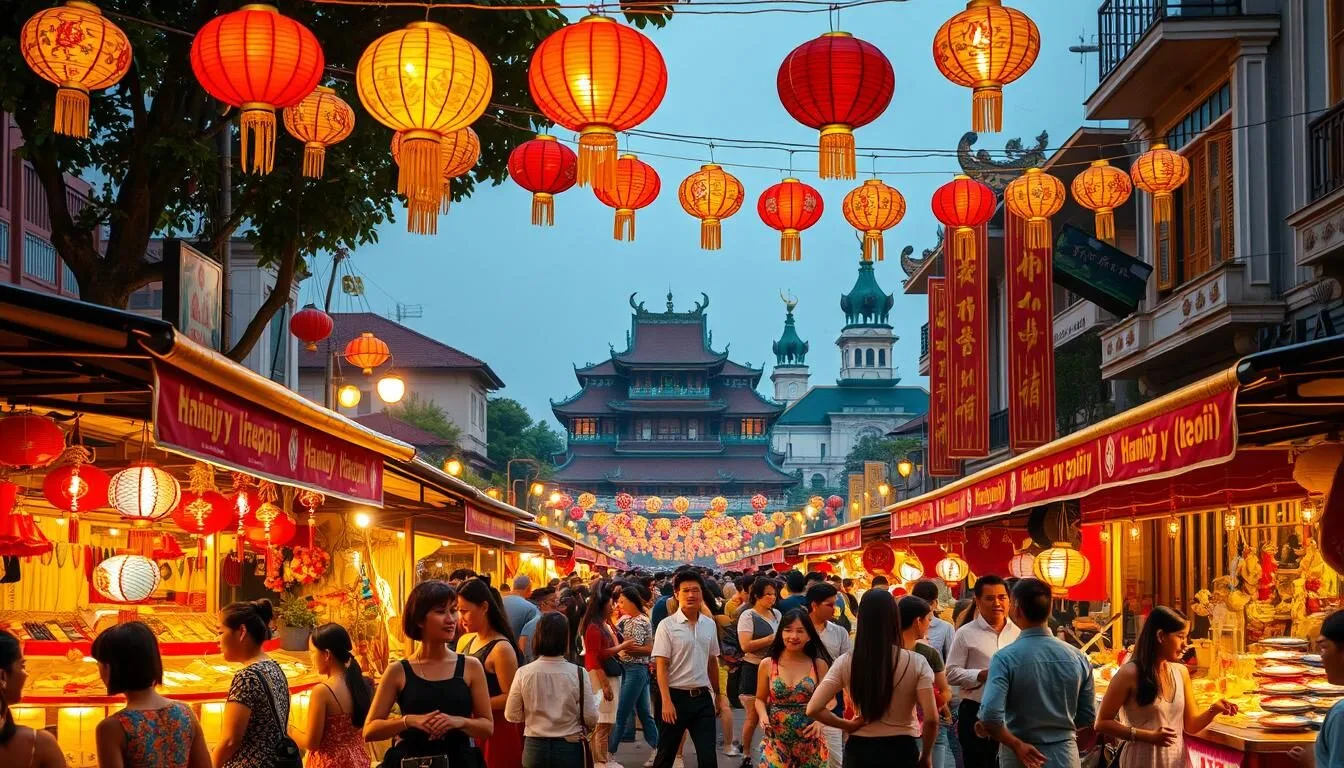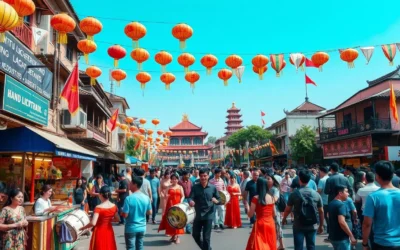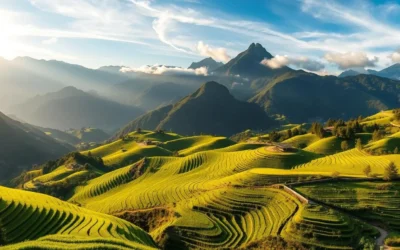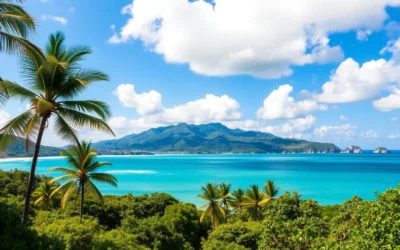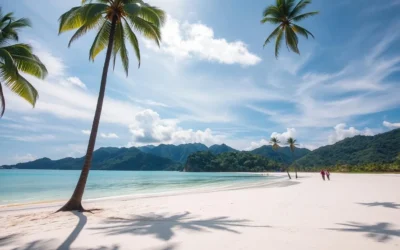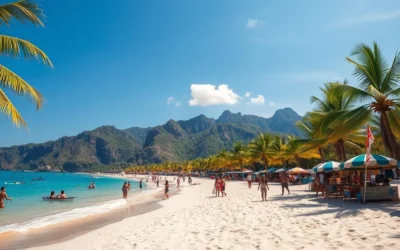Did you know that Hanoi, the vibrant capital of Vietnam, hosts over 30 festivals annually, each offering a unique glimpse into the country’s rich cultural heritage? Experiencing these local festivals provides a deeper understanding of Vietnamese traditions and community values.
From ancient religious ceremonies to colorful modern celebrations, Hanoi’s festival calendar is a perfect blend of historical preservation and contemporary cultural expression. You can witness traditional performances, taste seasonal delicacies, and participate in activities that have been celebrated for generations, making your travel experience truly unforgettable.
Planning your trip around these festivals can transform your vacation into an authentic cultural immersion, creating lasting memories of your time in Vietnam.
The Cultural Significance of Festivals in Vietnam
In Vietnam, festivals are not just celebrations; they are a way of life that connects the people to their heritage. These events are vibrant expressions of the country’s rich culture and history, offering a glimpse into the traditions that have shaped the nation.
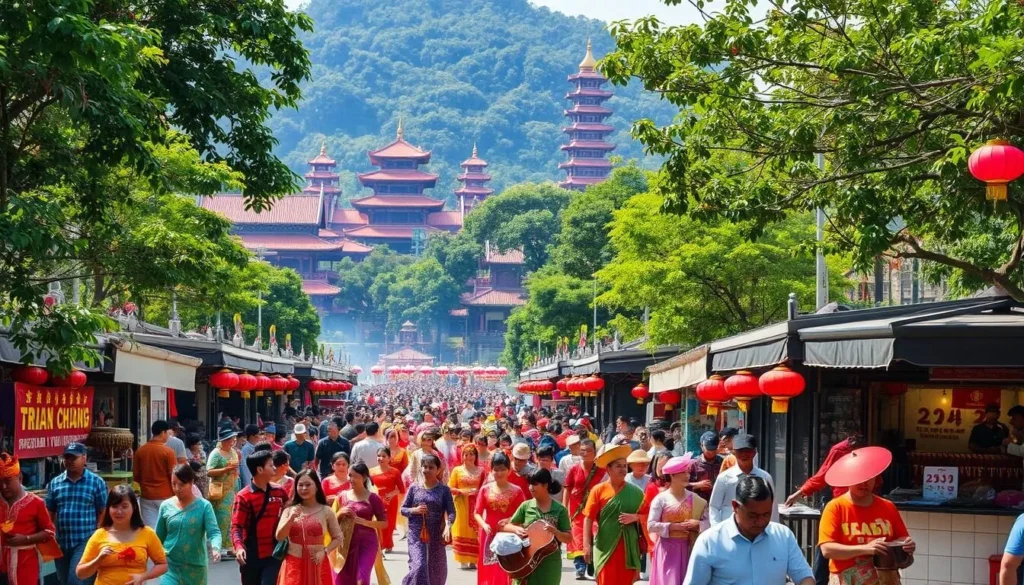
The Role of Festivals in Vietnamese Heritage
Festivals play a vital role in preserving Vietnamese heritage. They are occasions when the people come together to honor their ancestors and the gods, reaffirming their cultural identity. Through various rituals and performances, these festivals keep the cultural traditions alive, passing them down to younger generations.
- Modern Vietnamese festivals beautifully blend ancient traditions with contemporary elements.
- These celebrations serve as cultural touchstones, helping Vietnamese people maintain connections to their roots.
- For younger generations, festival participation provides tangible links to their heritage.
How Festivals Connect Past and Present in Vietnam
Vietnamese festivals create a bridge between the past and the present, allowing the country to honor its history while embracing modernity. By participating in these festivals, you’ll witness firsthand how Vietnam balances tradition with contemporary life, making each day of celebration unique.
As you experience the vibrant culture of Vietnam through its festivals, you’ll gain a deeper understanding of the nation’s values and traditions.
Best Time to Visit Hanoi for Festival Experiences
To experience the authentic spirit of Hanoi, it’s essential to plan your visit around the city’s most significant festivals. The city’s cultural calendar is filled with vibrant events that showcase its rich heritage.
Seasonal Festival Calendar
Most Vietnamese festivals take place in the spring, considered the most sacred time of the lunar year. This season is also the best time to travel to Vietnam, with dry and mild weather. During this period, the country is adorned with blooming flowers, creating picturesque landscapes.
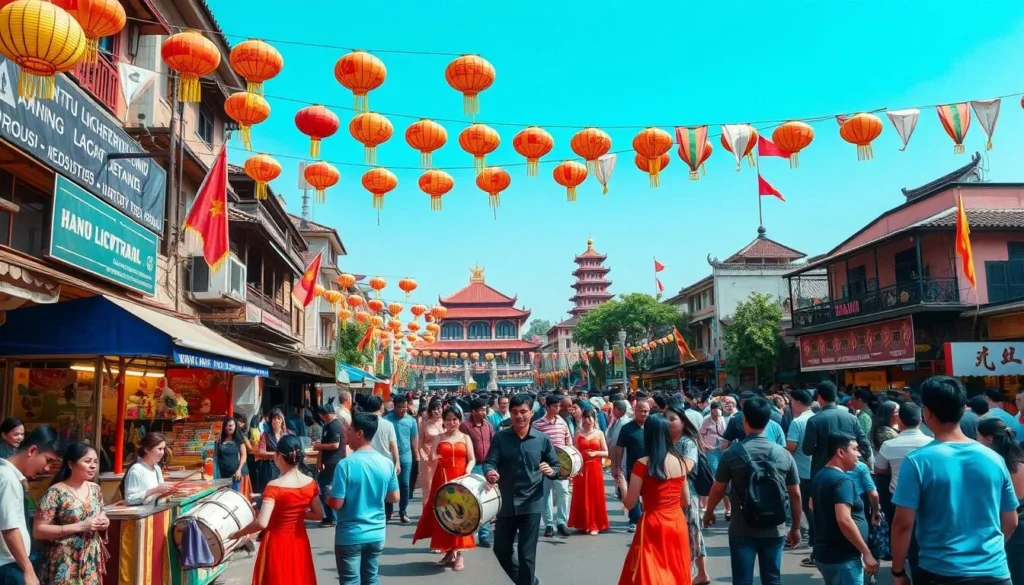
Planning Your Trip Around Major Celebrations
When planning your trip to Hanoi, consider the following tips to make the most of your festival experience:
- Book your accommodations well in advance, as hotels fill up quickly during major festivals.
- Plan for extra time to get around the city, as transportation can become challenging during festival periods.
- Be aware that many shops and restaurants may have altered hours or be closed during significant festivals like Tet.
- Consider the weather and plan your activities accordingly, as some festivals take place during Hanoi’s rainy season.
- Budget for festival participation, including special foods and offerings at temples.
By planning your visit around Hanoi’s festivals, you can enjoy a truly immersive cultural experience in this vibrant city.
Tet: Vietnam’s Most Important Festival
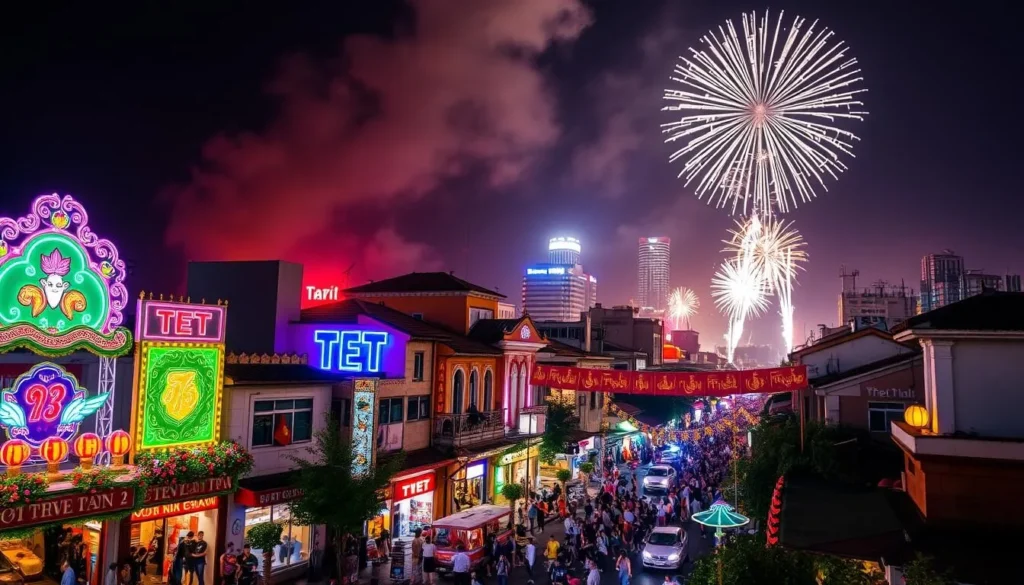
Tet, Vietnam’s most revered festival, is a spectacle not to be missed when visiting Hanoi. The Lunar New Year, or Tết, is Vietnam’s largest and most important festival, emphasizing family reunions and traditional customs. As a significant cultural event, Tet offers a unique experience for travelers, with various activities and festivities taking place throughout the city.
Traditions and Customs During Lunar New Year
During Tet, Vietnamese people adhere to various customs and traditions. The festival is a time for renewal and new beginnings, marked by visits to family and friends, and traditional activities such as cleaning homes, wearing new clothes, and exchanging gifts. The atmosphere is filled with excitement as locals prepare for the celebrations, decorating their homes with flowers, lanterns, and couplets.
Traditional Tet foods are also an integral part of the celebrations, with dishes like banh chung (sticky rice cakes) and mut (candied fruits) being prepared and shared among families. Visiting temples and pagodas, such as Ngoc Son Temple or Tran Quoc Pagoda, is another significant custom, where people pray for good fortune and prosperity in the new year.
How to Experience Tet as a Visitor in Hanoi
As a visitor to Hanoi during Tet, you can immerse yourself in the festive atmosphere by visiting flower markets like Quang Ba or Hang Luoc, which are filled with colorful blooms in the days leading up to the celebration. Joining locals at Hoan Kiem Lake for the midnight fireworks display is another unforgettable experience, marking the beginning of the new lunar year.
You can also sample traditional Tet foods available from street vendors and restaurants, explore Hanoi’s Old Quarter to see traditional calligraphy artists at work, and participate in cultural performances and folk games that take place in public spaces throughout the city. However, be aware that many businesses close during Tet, so it’s essential to plan your trip accordingly by booking accommodations and transportation in advance.
Lim Festival: A Celebration of Traditional Folk Songs
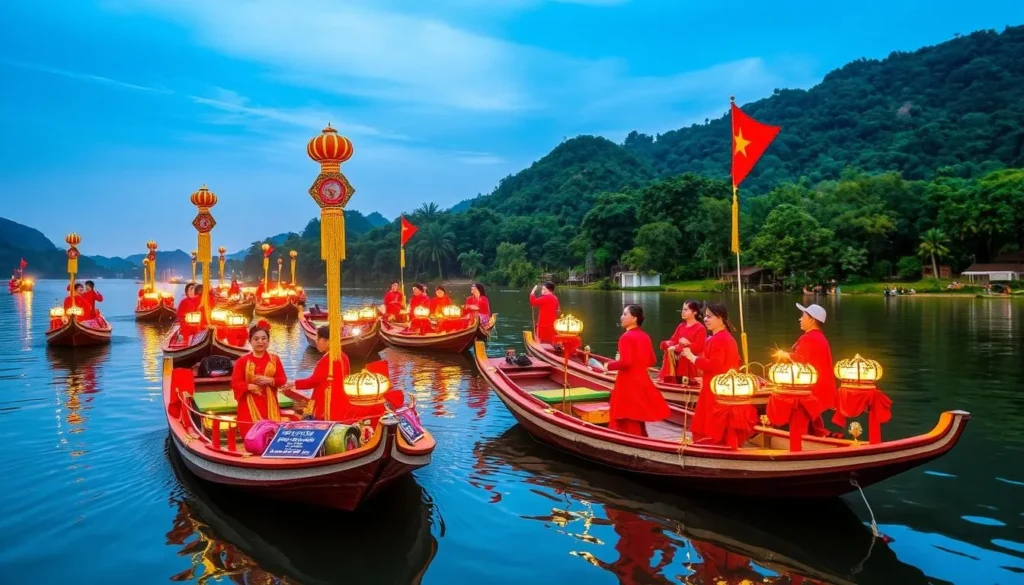
In the heart of Bac Ninh province, the Lim Festival comes alive with folk songs. This jovial celebration of spring commemorates the festival founder while highlighting the unique culture of the Red River Delta. The Lim Festival is held on the 12th or 13th day of the first lunar month, making it a significant event in the Vietnamese cultural calendar.
The Art of Quan Ho Folk Singing
The Lim Festival features the remarkable ritual of quan họ, a traditional form of folk singing. Men and women, dressed in traditional attire, serenade each other from aboard dragon boats. The haunting voices carrying across Lim Lake create a mesmerizing experience. Quan Ho folk singing is a highlight of the festival, showcasing the rich cultural heritage of the region.
Activities and Performances to Enjoy
During the Lim Festival, you can enjoy a variety of activities and performances. The festival features traditional folk games like human chess, wrestling matches, and bamboo swinging, which you can watch or participate in. You can also witness singers performing from decorated boats on Lim Lake, a scene that has remained largely unchanged for centuries. Additionally, visit the Lim Pagoda to see Buddhist ceremonies and offerings, and explore local artisans displaying traditional crafts.
The Lim Festival takes place in Lim village, approximately 18 miles from Hanoi, making it an accessible day trip. The festival grounds are filled with food stalls serving regional specialties from Bac Ninh province. In the evenings, lanterns illuminate the village, and impromptu singing performances spring up among visitors and locals alike, creating a lively atmosphere.
Perfume Pagoda Festival: A Spiritual Pilgrimage
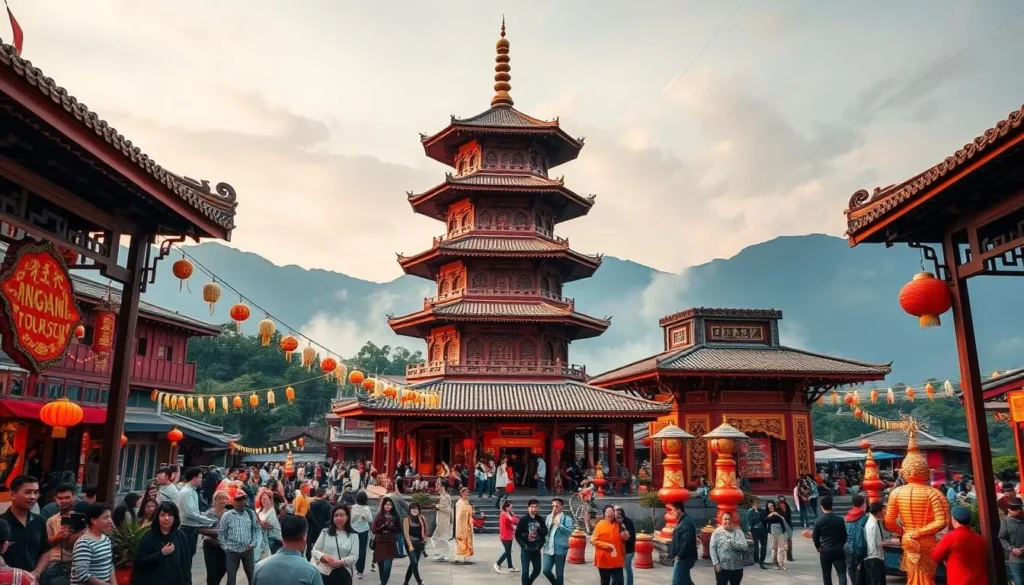
The Perfume Pagoda Festival is an annual celebration that combines spirituality, natural beauty, and cultural heritage. As one of the largest religious festivals in Vietnam, it attracts thousands of Buddhist pilgrims who come to pray for prosperity, good health, and happiness.
The Journey to the Sacred Caves
To reach the Perfume Pagoda, visitors take a scenic boat ride along the Yen Stream, followed by a hike up the mountain. This journey is not just about reaching a destination; it’s an integral part of the spiritual experience, allowing pilgrims to connect with nature and their inner selves.
Pilgrims begin their spiritual journey at Den Trinh (Registration Temple), where they make offerings and prayers before proceeding to the main pagoda complex.
Religious Rituals and Ceremonies
The central ritual involves lighting incense, making offerings of fruits, flowers, and food, and praying for blessings. Buddhist monks perform special ceremonies throughout the festival period, chanting sutras and leading devotees in prayer sessions.
Many visitors also engage in the practice of lotus flower floating, where candles are placed in lotus-shaped paper boats and set adrift on the water with prayers and wishes. The festival atmosphere combines deep religious devotion with elements of a spring outing, making it a unique experience.
By participating respectfully in these ceremonies, you can gain valuable insight into Vietnamese spiritual practices and cultural values. The Perfume Pagoda Festival is a truly unforgettable experience, filled with spiritual energy and breathtaking natural scenery.
Giong Festival: Honoring a Legendary Hero
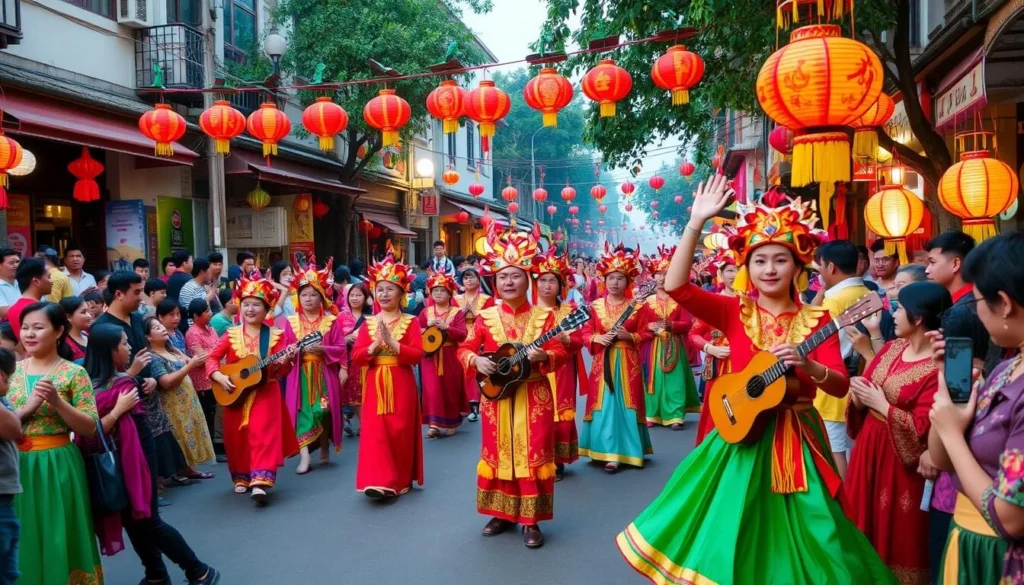
Experience the Giong Festival, a vibrant celebration honoring a legendary hero in Vietnamese culture. The Giong Festival is celebrated in many parts of Hanoi to commemorate Saint Giong, one of the four mighty immortals of Vietnam’s culture.
The Legend of Saint Giong
The mythology of Saint Giong tells the story of a national hero who defended the country against foreign enemies. Saint Giong is revered for his bravery and is considered a symbol of patriotism in Vietnamese culture. The festival is held at two significant temples: Phu Dong temple, where Giong was born, and Soc temple, where he ascended to heaven.
Battle Reenactments and Cultural Performances
The highlight of the Giong Festival is the elaborate battle reenactment, where performers dressed as soldiers with bamboo horses, flags, and weapons recreate Saint Giong’s legendary victory. The festival features a solemn procession, traditional music, and performances of “cheo” (traditional Vietnamese opera) and “tuong” (classical drama). Visitors can also participate in folk games that test strength and skill, symbolizing the preparation of warriors for battle in ancient times.
The Giong Festival is held on different days at the two temples. At Phu Dong temple, it’s celebrated from the 6th to the 8th day of the first lunar month, while at Soc temple, it’s held from the 8th to the 9th day of the 4th lunar month. This temple festival is a unique opportunity to experience Vietnam’s rich cultural heritage.
Mid-Autumn Festival: A Celebration for Children
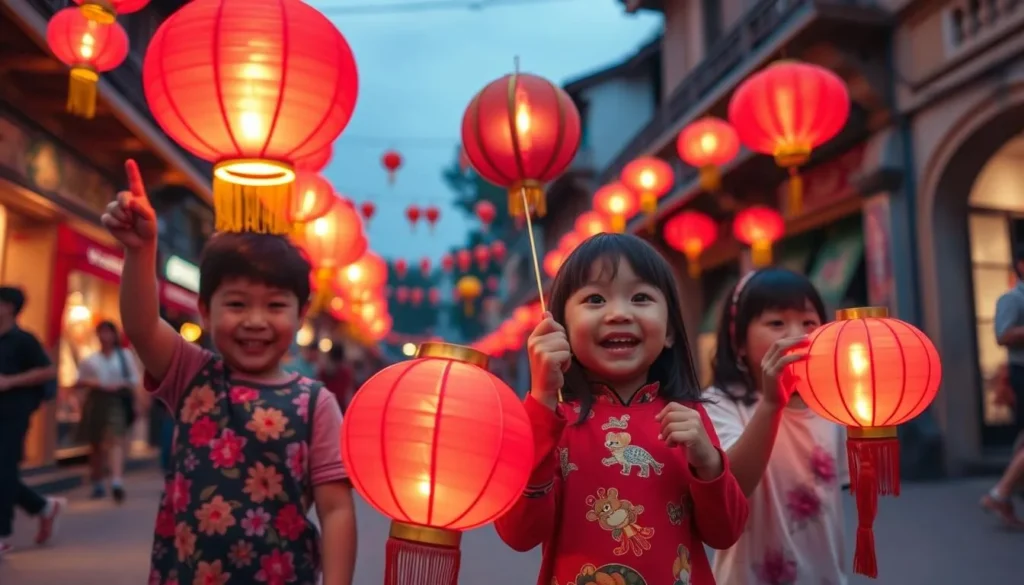
As the full moon rises, Hanoi comes alive with the vibrant spirit of the Mid-Autumn Festival, a special time for children. This cherished celebration is a time for families to gather, admire the full moon, and share mooncakes, a signature treat of the holiday. The festival symbolizes family togetherness and gratitude, making it a meaningful experience for both locals and visitors.
Lanterns, Mooncakes, and Folk Performances
The Mid-Autumn Festival is a visual spectacle in Hanoi, with lanterns of all shapes and sizes illuminating the streets. Hang Ma Street in Hanoi’s Old Quarter transforms into a colorful wonderland, creating a photographer’s paradise. The area around Hoan Kiem Lake hosts special Mid-Autumn events, including lantern displays, cultural performances, and children’s activities that continue for several days around the main festival date.
Visitors can enjoy lion and dragon dances, traditional folk performances that add to the festive atmosphere. The Thang Long Imperial Citadel organizes traditional games, lantern-making workshops, and cultural exhibitions, providing both entertainment and educational value about the festival’s history.
Best Places in Hanoi to Experience the Festival
Hanoi offers numerous spots to experience the Mid-Autumn Festival fully. The Vietnam Museum of Ethnology showcases how different ethnic groups throughout Vietnam celebrate Mid-Autumn, providing a broader cultural perspective. The West Lake area, particularly around Tay Ho Temple, features beautiful moon-viewing spots where families gather to enjoy the full moon reflection on the water.
Various community centers and cultural houses throughout Hanoi organize Mid-Autumn parties for local children, offering an authentic experience of how modern Vietnamese families celebrate. Major hotels and restaurants in Hanoi create special Mid-Autumn packages and menus, allowing visitors to taste gourmet interpretations of traditional festival foods in comfortable settings.
Hanoi, Vietnam: Top Festivals to Check Out When Visiting Throughout the Year
If you’re planning to visit Hanoi, you’ll be treated to a calendar full of festivals that highlight the city’s unique cultural identity. These festivals offer a glimpse into Hanoi’s rich heritage and are a great way to experience the local culture.
Ghost Festival/Wandering Souls Day
The Ghost Festival, also known as Wandering Souls Day, is a significant event in Vietnamese culture. It is believed that on this day, the gates of hell are opened, and spirits roam the earth. People often make offerings to their ancestors and burn incense to honor the spirits.
Independence Day Celebrations
Independence Day in Vietnam is celebrated on September 2nd, commemorating the country’s declaration of independence from French colonial rule in 1945. Hanoi hosts various events and parades to mark this important national holiday.
Dong Ky Firecracker Festival
The Dong Ky Firecracker Festival takes place in Dong Ky village, about 30 kilometers east of Hanoi, beginning on the 4th day of the first lunar month. This festival honors General Thien Cuong, who helped the Hung Kings fight against invaders. The highlight of the festival is the elaborate firecracker procession, where locals parade with giant, decorated firecrackers.
- The festival can last up to twenty days, featuring a massive decorative firecracker that is paraded through the village.
- Despite the ban on actual firecracker detonation since 1994, the festival continues with symbolic firecrackers, preserving tradition without safety hazards.
- The firecrackers are meticulously crafted from wood and paper, adorned with intricate designs representing auspicious symbols.
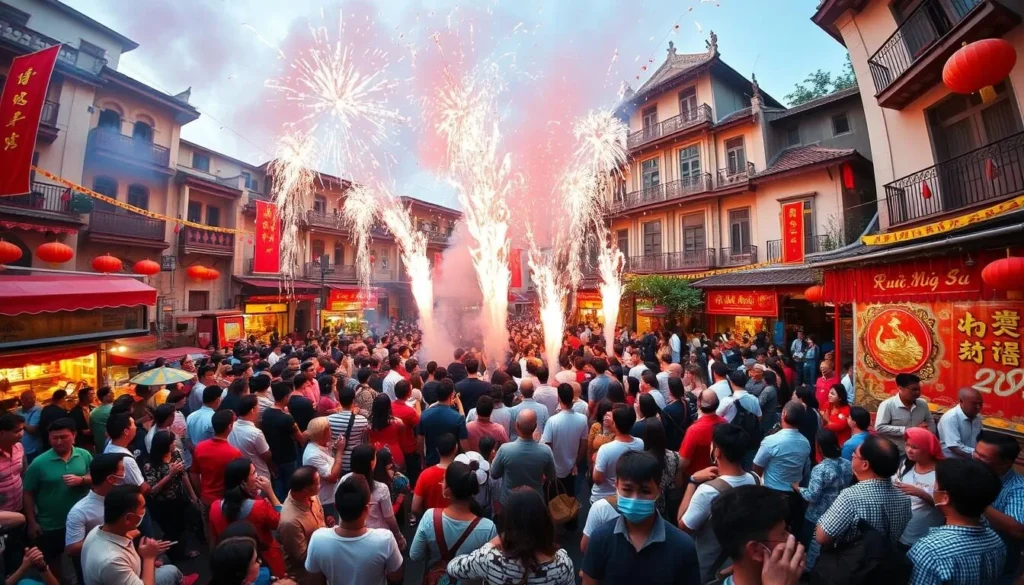
The Dong Ky Firecracker Festival is a unique cultural experience that showcases the village’s heritage and traditions. Visitors can enjoy traditional games, folk performances, and a special market selling local crafts.
Traditional Festival Foods You Must Try
Food plays a significant role in Vietnamese festivals, with each celebration having its own unique and delicious offerings. When you visit Hanoi during festivals, you can experience the rich culinary heritage of Vietnam through its traditional festival foods.
Seasonal Delicacies at Different Celebrations
Each festival in Hanoi comes with its own signature dishes, deeply rooted in tradition and meaning. For instance, during the Lunar New Year (Tet), Banh Chung and Banh Tet are iconic dishes. Banh Chung is a square-shaped sticky rice cake filled with pork and mung beans, wrapped in banana leaves, while Banh Tet is its cylindrical counterpart, more popular in Southern Vietnam.
- Banh Chung and Banh Tet are must-try dishes during Tet.
- Mooncakes are a highlight of the Mid-Autumn Festival.
- Vegetarian dishes are prominent during the Wandering Souls Day.
Where to Find the Best Festival Foods in Hanoi
Hanoi offers numerous places to enjoy traditional festival foods. You can visit Hang Be Market in the weeks leading up to Lunar New Year to watch the wrapping process and purchase freshly made Banh Chung. During the Mid-Autumn Festival, Hang Duong Street becomes a hub for mooncakes, with both traditional bakeries and luxury hotel brands setting up special stalls.
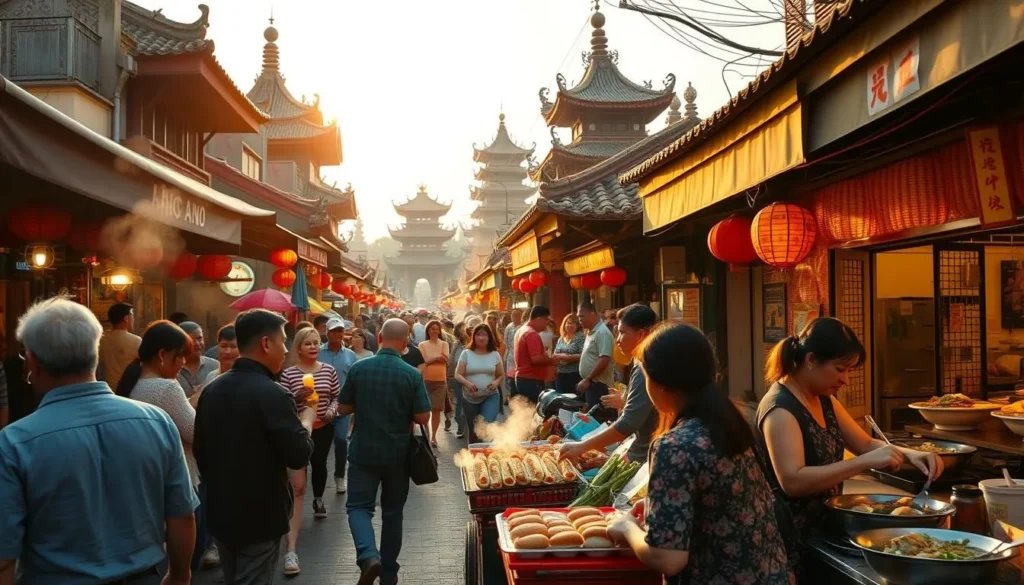
- Try Xoi Yen on Nguyen Huu Huan Street for sweet sticky rice dishes.
- Visit the night market in Hanoi’s Old Quarter on weekends for various festival specialties.
- Restaurants like Quan An Ngon and Highway4 offer special festival menus.
Conclusion: Embracing the Festive Spirit of Hanoi
Experiencing Hanoi’s festivals is a journey into the heart of Vietnamese culture and tradition. As you’ve seen, the city’s calendar is filled with vibrant celebrations that offer more than just typical tourist activities.
The cyclical nature of Vietnam’s festival calendar means that no matter when you plan your trip to Hanoi, you’re likely to encounter a cultural celebration that enriches your understanding of the country. By participating in these festivals, you’ll create lasting memories that capture the authentic spirit of Vietnam.
Hanoi’s festivals are not just events; they’re a window into the city’s rich history and the people who keep these traditions alive. Whether you’re drawn to the spiritual aspects, the culinary traditions, or the joyful community atmosphere, there’s something meaningful for every type of traveler seeking authentic cultural experiences.
As you travel through Hanoi at different times of the year, you’ll witness the city transform through various celebrations, each bringing its unique atmosphere, traditions, and flavors. The preservation of these ancient festivals alongside Hanoi’s rapid modernization showcases Vietnam’s ability to honor its past while embracing the future.
In conclusion, Hanoi’s festivals offer a unique and enriching experience that goes beyond sightseeing. They provide opportunities for meaningful cultural exchange and a deeper understanding of Vietnamese culture and history. So, time your trip to coincide with one of these vibrant celebrations and immerse yourself in the festive spirit of Hanoi.
The above is subject to change.
Check back often to TRAVEL.COM for the latest travel tips and deals.
